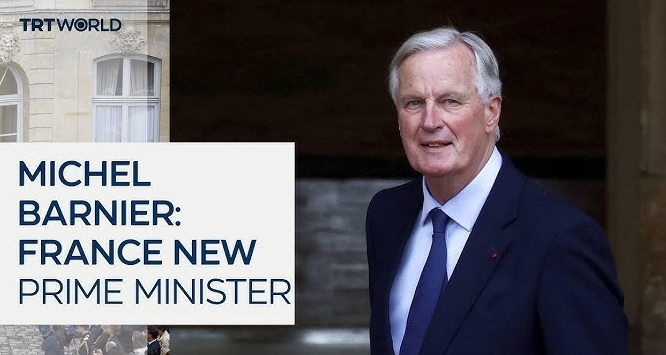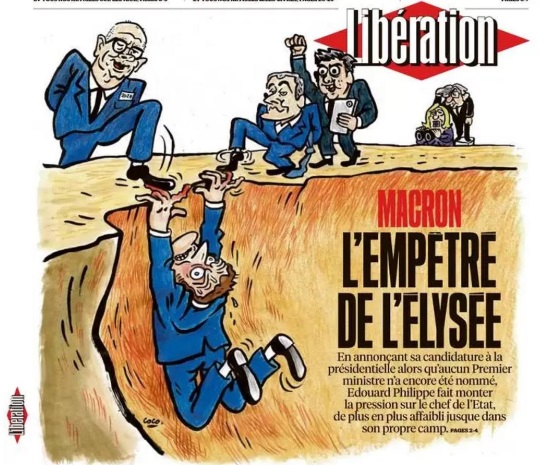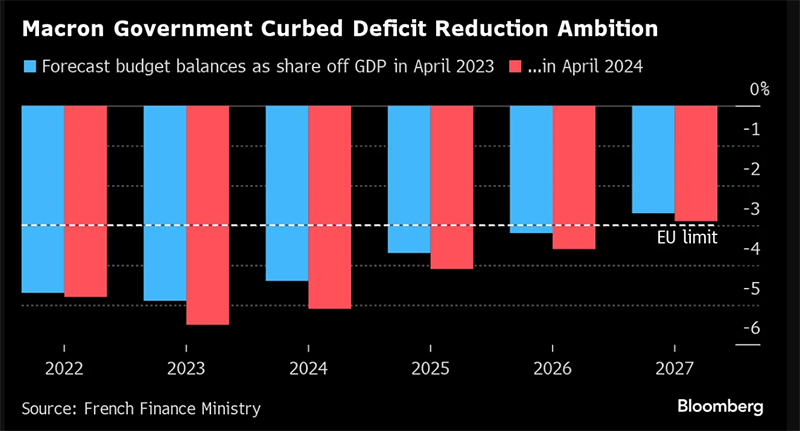
France’s new Premier, Barnier, faced with Parliamentary chaos, notes Bloomberg.
Michel Barnier, a former foreign minister and European commissioner, has kept away from French politics since suffering defeat in his party primary ahead of the 2022 presidential election. But in a bitterly divided parliament with little prospect of any major policy advances, that lack of a political base is one of the qualities that made the 73-year-old conservative a viable candidate to become France’s next prime minister, writes Bloomberg.
President Emmanuel Macron has been casting around under increasing pressure to find a premier who won’t immediately be toppled by the powerful factions lined up against him since this summer’s parliamentary election. On Thursday, he finally landed on Barnier.
“Michel Barnier isn’t making anyone dream,” Sebastien Chenu, the vice president of Le Pen’s National Rally, told BFM TV before the announcement. “But since we know that the next prime minister won’t be in line with our political views, we have to take stock.”
Barnier’s appointment also shows how Macron’s own political project is unraveling.
Macron took office in 2017 as the figurehead of a new generation, promising to move France beyond the dogmatic limitations of traditional parties and as a bulwark against extremism. Seven years later, the far-right National Rally has more lawmakers than any other single party in the lower house of parliament and he’s turning to an opponent from the distant past to restore a modicum of stability.
Barnier entered politics in the 1970s and was once France’s youngest lawmaker. Until recently, Barnier himself was calling for the end of ‘Macronism’ on his website.
His reputation as a moderate, seasoned center-right politician gives him a shot at forming a government with enough support among right-wing parties to be able to survive a no-confidence motion in the National Assembly, where no bloc commands an outright majority.
Le Pen indicated that she will accept Barnier’s appointment, at least in the short term.
“As we told the president, we demand that the new prime minister respects the 11 million French people who voted National Rally,” she said on X. “We’ll pay close attention to his policies and we’ll be watchful that the aspirations of our voters, who represent a third of French people, are heard and respected.”
Despite becoming a key figure for investors as the European Union’s chief Brexit negotiator, Barnier remains unknown to many in France outside elite circles. In picking him, Macron is demonstrating that stability is his main priority, even if he has also found a premier who holds some of the same economic priorities.
In his book, “The Great Illusion,” Barnier wrote a detailed account of the highs and lows of the Brexit negotiations, which ended with a deal but failed to solve many issues, including fishing rights for European fishermen in British waters.
In recent years, he has toughened his stance on immigration and ties to the EU, advocating for more sovereignty for France.
In an interview with The Telegraph in June, Barnier blasted Macron’s decision to call snap elections.
“It’s always risky to take a decision that nobody understands,” he said.
 Cover of the Liberation newspaper. Chaos in the Elysee Palace – Macron is drowned by stoves by people from his camp.
Cover of the Liberation newspaper. Chaos in the Elysee Palace – Macron is drowned by stoves by people from his camp.
You know political speculation has gotten out of control when even children are badgering the French prime minister on who his successor will be, writes POLITICO.
Rife conjecture, lengthy talks and a constantly changing list of possible candidates have marked French President Emmanuel Macron’s latest push to break the deadlock that has gripped France since snap elections this summer delivered a hung parliament. As the French returned to work and school on Monday, their country appeared no closer to having a government than it did before the Olympics.
The day began with Bernard Cazeneuve as the apparent front-runner, but the former prime minister was out of contention after lunch. Then, it was rumored that Macron was in talks to appoint a little-known top civil servant, Thierry Beaudet, to the post. Overnight, conservative heavyweight Xavier Bertrand replaced Beaudet as the new favorite.
Macron on Tuesday held talks with conservative leaders including Senate leader Gérard Larcher and conservative parliamentary leader Laurent Wauquiez, according to several people with knowledge of the talks who were granted anonymity because they were not authorized to speak publicly, seemingly solidifying Bertrand’s status as likely nominee.
But by Tuesday afternoon, Bertrand was already facing serious objections to his appointment.
The last 36 hours have baffled even seasoned political observers, and inspired no shortage of mocking memes and jokes online. French journalist Diane de Fortanier tweeted a mock graph of the rise and fall of potential candidates, while former Elysée official Gaspard Gantzer poked fun at Macron’s dithering and endless consultations — joking he’d next be meeting with French prime ministers, winners at the Césars and Tour de France champions.
Even outgoing Prime Minister Gabriel Attal couldn’t escape the frenzy during a visit to a school in the Paris region on Monday, when he got a grilling by pupils over who the next prime minister will be and whether he was still friends with the French president.
In many other European countries, parliamentary democracy and difficult coalition talks are the norm, and these lengthy consultations would be par for the course. But in France, where the presidential system has guaranteed political stability since the beginning of the Fifth Republic, the uncertainty is unprecedented.
A caretaker government has run the country since July, when ministers resigned following snap elections in June that failed to deliver an absolute majority in the French National Assembly. The New Popular Front, an alliance of parties on the left, won the most seats.
But Macron has resisted appointing Lucie Castets, the left’s candidate for prime minister, arguing that the New Popular Front does not have enough support in the National Assembly and wouldn’t survive a vote of no confidence.
Instead former socialist PM Cazeneuve was seen as the front-runner to lead a new government in recent days. As a politician from the left, his appointment would have been a nod to the New Popular Front’s victory without actually handing the group power. Cazeneuve left the Socialist Party, one of the New Popular Front’s four main members, in 2022 in opposition to a previous alliance with the far left.
Cazeneuve was one of six different people from across the political spectrum to meet with Macron on Monday. Among them were Bertrand — the prime ministerial candidate from the center-right who serves as president of the Hauts-de-France region — and former presidents Nicolas Sarkozy and François Hollande.
It would also have spared Macron the humiliation of handing the reins of government to his opponents on the right or the left.
“He’s going to get gobbled up by the crocodiles,” one government adviser told Playbook Paris. “You can’t dither for seven weeks and then appoint a technician who will deliver Macronist [policies], it would be a negation of the election,” said one official belonging to Macron’s Renaissance party.

France's public deficit this year could be far worse than forecast because the country is expecting less tax income than previously thought.
The budget deficit — the difference between how much a country spends and receives — could reach 5.6 percent of the country's GDP instead of the 5.1 previously predicted, according to a note sent on Monday by the French finance ministry to lawmakers in charge of the budget, and obtained by POLITICO.
The note stressed that the figure is not the country's official deficit forecast but just a predicted worst case scenario.
The gloomy warning comes as France is doing without a government and is under increased EU scrutiny, known as an excessive deficit procedure, for an overspend in 2023.
France already revised its deficit target for 2024 from an initial 4.4 percent of GDP to 5.1 percent. It also missed its deficit target last year (5.5 percent of GDP instead of 4.9 percent.)
The outgoing government has made it clear that it will be the responsibility of its successor to present the budget for 2025 and address its spending plans to the European Commission as part of the excessive deficit procedure.
read more in our Telegram-channel https://t.me/The_International_Affairs

 10:42 06.09.2024 •
10:42 06.09.2024 •






















